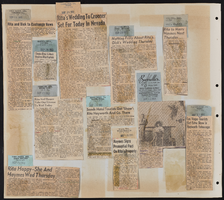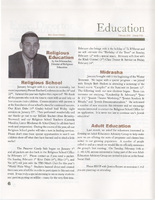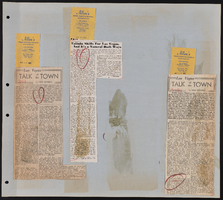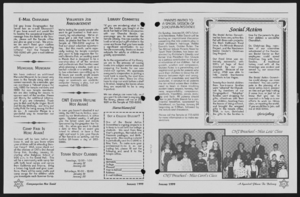Search the Special Collections and Archives Portal
Search Results
Toni and Wilbur Clark Photographs
Identifier
Abstract
The Toni and Wilbur Clark Photographs depict Las Vegas, Nevada casino owner and land developer Wilbur Clark and his wife Toni from 1910 to 1975. The photographs primarily document Wilbur and Toni Clark at the Desert Inn, the hotel and casino Wilbur co-owned. The photographs also depict him with politicians and entertainers, and Wilbur and Toni Clark’s house in Las Vegas.
Archival Collection
K. O. Knudson Photograph Collection
Identifier
Abstract
The K. O. Knudson Photographs (approximately 1920-1969) depict the Las Vegas Grammar School and service, fraternal, and veterans organizations gathered by retired Las Vegas, Nevada school administrator and World War I veteran K. O. Knudson (also known as K. Oscar Knudson). The collection includes images of Knudson, Las Vegas Masonic Lodge members, American Legion members, and school dances. The photographs primarily feature Las Vegas, Nevada.
Archival Collection
Emily Higby Powell Photograph Album
Identifier
Abstract
The Emily Higby Powell Photograph Album (approximately 1910-1920) contains black-and-white photographs taken by Emily Higby Powell on a trip from New York to the west coast. The images depict desert landscape throughout the Southwest, including Northern Nevada, as well as images taken on Lake Champlain in Essex, New York.
Archival Collection

Stavan Corbett oral history interview: transcript
Date
Archival Collection
Description
Oral history interview with Stavan Corbett conducted by Nathalie Martinez on November 5, 2018 for the Latinx Voices of Southern Nevada Oral History Project. Barbara Tabach and Rodrigo Vazquez also participate in the questioning. Stavan Corbett is a member of the Latino community who has served as an educator and politician in Las Vegas. Growing up in Las Vegas, Stavan was exposed to various environments that all helped him shape his Latino identity. Stavan was able to appreciate the Catholic and Jewish cultures as well. During the 1970s and '80s his experiences with first and second generation Latinos played a large role in his identity formation, especially as a student. He was the first in his family to graduate from high school and college. Stavan worked in the hotel industry and moved on to work with troubled youth and eventually become a member of the Nevada State Board and the Clark County School Board. His continued work with the Latin Chamber of Commerce has also allowed him to be involved with the Latino Youth Leadership Conference. Subjects discussed include: Identity Struggle, Interracial Relationships, Working in the Hotel Industry, Clark County School District, and Cultural Assimilation.
Text
Keith Whitfield (University of Nevada, Las Vegas) oral history interview conducted by Kelliann Beavers and Taylor Cummings: transcript
Date
Archival Collection
Description
From the Lincy Institute "Perspectives from the COVID-19 Pandemic" Oral History Project (MS-01178) -- Education sector interviews file.
Text

Transcript of interview with Billy Paul Smith by Claytee White, October 3, 2013
Date
Archival Collection
Description
Chemist, mathematician, and health physicist Billy Paul Smith donates time to tutor young people in hopes of attracting more youth into the fields of math and science. Born in 1942 and schooled in segregated black schools in Shreveport, Louisiana, and Texarkana, Texas, he graduated from high school at age fifteen and enrolled at Prairie View A&M University, where he trained with the Reserve Officer Training Corps (ROTC) and earned his Bachelor’s degree in chemistry and in 1964 his Master’s degrees in chemistry and math. Most young U.S. Army officers in 1964 went to Vietnam, but Billy’s math and science background steered him to the Army Chemical Corps, where he was quickly selected to join a new team. The team was to develop responses to nuclear weapon accidents and worked under the Defense Atomic Support Agency (DASA) in Albuquerque, New Mexico. At the same time, Billy completed the Weapons Ordinance Army course on classified information relating to the U.S. nuclear weapons arsenal. In this interview, Billy talks about his service with DASA and his subsequent twenty-seven years working at the Nevada Test Site in a variety of positions with Reynolds Electrical and Engineering Company, Inc. (REECo), a company that had “percentagewise more blacks in management positions than any other [Las Vegas] company.” He experienced the quiet racism of Las Vegas residential segregation when he tried to purchase a house in a neighborhood he liked and the unexpected kindness of the REECo general manager, Ron Keen, who made sure the Smith family could live where they wanted to live. He talks about Area 51 and explains underground testing activity and offers the scientific and ecological reasons why scientists deemed Yucca Mountain safe to store nuclear waste. After retiring at fifty-two, Billy and a colleague formed an independent instrumentation company, which, from 1995–2005 provided and calibrated radiological measurement and detection instruments for the decommissioning and closure of the Rocky Flats nuclear plant in Golden, Colorado. During that time, Billy rented an apartment in Boulder, but he and Jackie maintained their Las Vegas home, where they still reside. Billy shares memories of places he and his wife used to enjoy on the Westside and tells of their longtime friends in the black community. He also talks about developing his philosophy of philanthropy through Alpha Phi Alpha Fraternity and discusses becoming a member of the Knowledge Fund Advisory Council for the Governor’s Office of Economic Development (GOED) and the advisory council for the Nevada System of Higher Education.
Text




